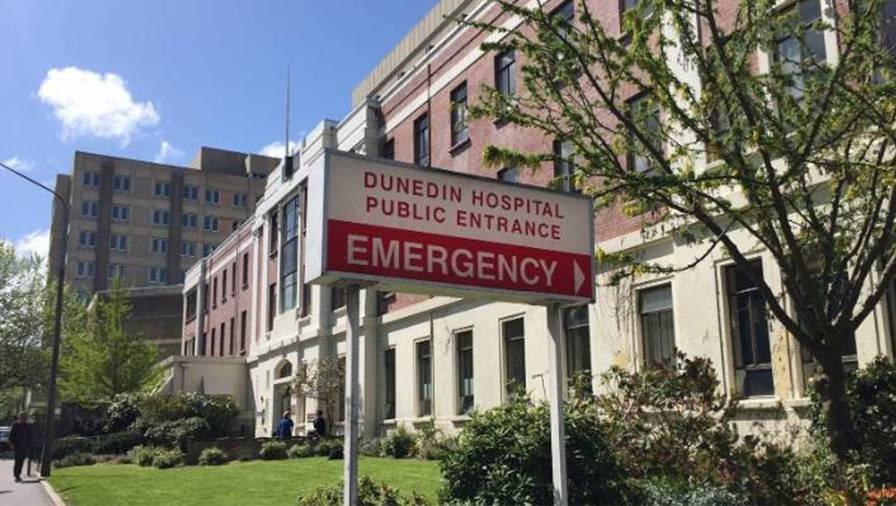

The challenges of health, quarterly action plans, mining
ANALYSIS: The Government faces criticism over its decision on Dunedin Hospital.
WATCH: Simon Shepherd speaks with NBR political editor Brent Edwards.


ANALYSIS: The Government faces criticism over its decision on Dunedin Hospital.
WATCH: Simon Shepherd speaks with NBR political editor Brent Edwards.
Just a week after the Government announced it was scaling back the rebuild of Dunedin Hospital – breaking an election promise in the process – the anger down south shows no sign of dissipating.
The National Party might not be too worried, given Dunedin is a Labour town, but outlying areas in Otago and Southland are also affected and that is National territory.
After 35,000 people marched in Dunedin over the weekend to protest at the Government’s decision, civic leaders from the region has also weighed in with their concerns.
The Government canned the planned rebuild after costs escalated but Clutha mayor Bryan Cadogan told RNZ’s Checkpoint programme this week that, as recently as two weeks ago, the Otago mayoral forum had been given assurances that promises about the rebuild would be kept.
Cadogan was unimpressed with the Government’s defence that, when National made its promise before the election, it did not know of the blow-out in costs and that the previous Labour Government had hidden the problem.
“We not getting the clear picture. It was categorically clear what was happening at election time; now it’s mysterious. And for the lower south, we’re getting sick of it,” he said.
It seems the Government – National in particular – has some work to do to placate the deep south. Much might depend on what finally is the outcome of its consideration of what will replace the new hospital, either a scaled-down version or a refurbishment of the existing hospital.

The debate over Dunedin Hospital is unlikely to die away any time soon.
Meanwhile, Health Minister Shane Reti has announced progress on the Government’s health targets.
It’s early days but, on most measures, things are getting slightly better from one quarter to the next. For the three months to the end of June, meeting the cancer treatment waiting time had increased from 82.7% to 83.5% and Reti expects that to improve further as new cancer drugs come online from the beginning of this month. There were also small improvements in the time taken to treat people in emergency departments and waiting times for specialist treatment improved, although patients are still waiting too long to be assessed.
But one clear failure is on immunisation rates, with 76.5% of children immunised at 24 months compared with 77.2% in the previous quarter.
And Health New Zealand’s financial position had continued to get worse, with a deficit of $934 million for the June year, compared with a $299m surplus forecast quarter three.
But Labour’s health spokesperson Ayesha Verrall says more than $500m of the deficit is down to the Government deciding not to transfer funds set aside for pay equity for nurses, midwives, and allied health staff.
Verrall says the quarterly performance report also shows that people are waiting longer for specialist appointments under the Government than they did under Labour.
“Over three of the last four quarters, the number of people waiting more than four months for a procedure increased from the corresponding quarter last year,” she says.

Labour’s health spokesperson Ayesha Verrall.
Associate Health Minister Casey Costello is still under pressure over tobacco policy, particularly her promotion of heated tobacco products by giving them a 50% tax cut.
RNZ reports the Treasury told her that tobacco company Philip Morris would be the biggest winner from the cut and officials said there was no compelling evidence the devices helped stop smoking. But Costello relied on independent advice, which she finally released this week.
The advice turned out to be largely a series of articles, rather than compelling scientific research.
Prime Minister Christopher Luxon says he trusts the minister, but Labour is calling on him to sack her over her handling of the matter.
Costello, who only joined New Zealand First a few months before last year’s election, might be the scapegoat for the party. NBR understands New Zealand First leader Winston Peters first promoted the policy when the party was in coalition with Labour from 2017 to 2020, but it was firmly rejected by then Prime Minister Jacinda Ardern.
The issue is unlikely to die away and Luxon might not be able to fob it off as easily as he has so far.

The Government’s change to anti-smoking policies is another area where it faces strong criticism.
Meanwhile, he released the Government’s quarterly action plan for the three months to the end of December and reported on the outcomes for the September-quarter plan.
Luxon reported that the Government had delivered on 39 of its 40 action points in the September quarter, with a big focus on law and order. It included passing legislation giving the police more powers to crack down on gangs, as well as banning gang patches in public.
“We have also introduced major sentencing reforms that will ensure criminals receive tougher sentences that reflect the harm they cause to their fellow Kiwis,” he says.
It also passed the legislation setting up the Coalition’s alternative to Labour’s Three Waters reform, reversed blanket speed limit reductions, opened the $1.2 billion regional infrastructure fund, and released a draft of the new primary schools’ English and maths curriculums for public consultation.

Prime Minister Christopher Luxon.
In the run-up to Christmas, the focus is on infrastructure, which includes passing the Fast-track Approvals Bill and the first Resource Management Amendment Bill, plus introducing a second amendment bill to cut through red and green tape. It will also introduce legislation to make it easier to build offshore wind farms and make decisions on funding and financing tools to get more houses built.
This week, the Ministry of Business, Innovation, and Employment released its analysis of the submissions on the Government’s draft mineral strategy, which Resources Minister Shane Jones says are mostly in favour of the strategy.
Possibly, but MBIE’s analysis of the submissions reveals significant concerns among submitters. Many oppose any new coal mines being approved and also want seabed mining and the Fast-track Approvals Bill excluded from the strategy.
To retain broad support for the strategy, the Government might have to make some significant changes. MBIE’s analysis shows 26% of submitters’ main concern was for the environment, 25% of submissions were about Treaty of Waitangi concerns,11% concerning the idea of a social licence and public perception, 10% with regulatory and procedural improvements, and 8% were concerned about innovation, research, the circular economy, and recycling.
MBIE is due to report the final version of the strategy back to ministers by Christmas.
Next week, further interest rate relief is likely to be delivered when the Reserve Bank reviews the official cash rate on Wednesday. Many economists are now picking it will be cut by 50 basis points, taking the OCR down to 4.75% before another 50 basis points cut in November.
If so, that will be good news for businesses and households on the eve of Christmas, as well as a political boost for the Government.
On Thursday, the Government releases its final accounts for the year ended June 30, which will give another glimpse into the state of its books. Both announcements are likely to prompt plenty of debate about monetary, fiscal, and economic policy.
Beehive Banter is now hosted by Simon Shepherd, with NBR’s political editor Brent Edwards.